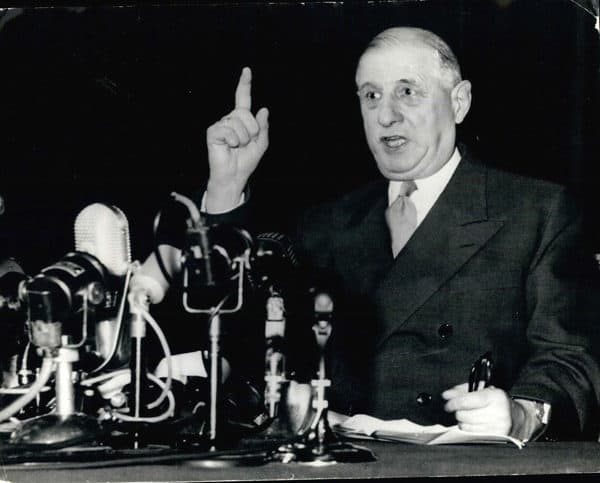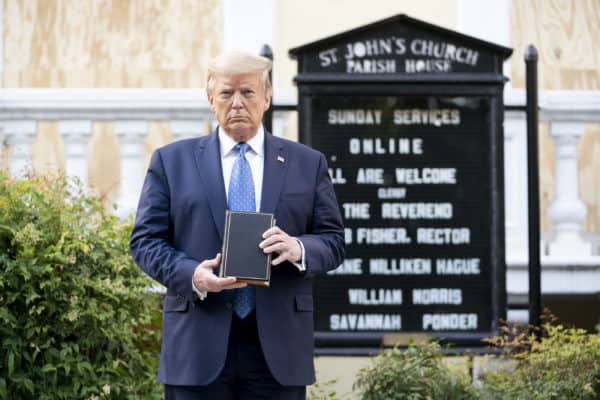Could Trump Have a Gaullist Moment?
Sinclair Jenkins, American Renaissance, June 15, 2020
1968 is a byword for political instability. As bad as the year was in the US, with many race riots and two assassinations, the year almost ended the French Fourth Republic. Between 1947 and 1954, the Fourth Republic saw the rise and fall of 15 different cabinets. The revolving door of mostly center-left politicians tried and failed to maintain France’s colonial possessions in Indochina. The Algerian insurgency, which began in the French-Arab city of Algiers in 1954, saw street-level assassinations of police officers, inter-communal violence, and eventually running battles with the French Army.
As in all periods of instability, the average Frenchman cried out for security. In post-World War II France, only one man offered the emotional power to unite France: Charles de Gaulle. In 1958, with the war going badly in Algeria and a military putsch in Algiers, de Gaulle returned to power and drafted a new constitution that gave the executive more power. Thus was born the French Fifth Republic.

General Charles de Gaulle. (Credit Image: © Keystone Pictures USA / ZUMAPRESS.com)
The new republic managed to end the war in Algeria with a victory (although Algeria became independent) and put down the Algiers Putsch of 1961, which tried to persuade de Gaulle not to abandon Algeria. Algeria-is-part-of-France diehards in the OAS (Secret Army Organization) fought de Gaulle’s supposed perfidy, and came close to assassinating him in 1962.
The riots that began in Paris in May 1968 nearly removed de Gaulle from the presidency. As with our current sickness, the problems began in the universities. University students, many of them admirers of Mao, Lenin, Castro, and Trotsky, shut down classes and held “teach-ins” to preach even more leftism on campuses. The May 1968 civil unrest was called “a revolution that is something of a party,” but students and sympathetic trade unions halted the French economy for weeks. Street violence was widespread.
How did de Gaulle react? “No weakness!” he told his ministers. “Those who want to attack the state and the nation must be resisted.” The CRS (Republican Security Companies) took back the streets, despite being compared to the Nazi SS by rampaging students. De Gaulle held the Fifth Republic together, and managed a relatively smooth transition to a new president, Georges Pompidou, in 1969.
America is facing a version of France’s 1968 nightmare. After the death of George Floyd, looting and arson caused billions of dollars damage as rioters raged against “white supremacy” and “systemic racism.” The Democrats bowed to the mob; Minneapolis plans to abolish its police force, while the House unveiled the so-called Justice in Policing Act.
It took days for President Donald Trump to demand law and order on America’s streets. He sent the National Guard to Washington, DC, and smoke (not tear gas) cleared a path for him to stand in front of St. John’s Church, which rioters had burned the night before. Bible in hand, President Trump tried to convey a sense of power. It didn’t work.

Credit Image: © Shealah Craighead / White House / ZUMA Wire / ZUMAPRESS.com
Mr. Trump should have acted like de Gaulle. Like de Gaulle, he is not ideological. He acts on conservative and patriotic instincts. According to biographer Jonathan Fenby in The General: Charles de Gaulle and the France He Saved, Trumpism is like Gaullism, which “consisted mainly of a series of pronouncements from the leader that hardly amounted to a platform on which a country could be run.” In practice, Gaullism came to represent an enlarged and strengthened state that had popular support. Gaullism let capitalism flourish within limits, but was skeptical of it. France nationalized several industries.
De Gaulle also charted a course separate from the UN and NATO, which de Gaulle saw as American puppets. Gaullism today represents the legacy of anti-Communism of the French center-right. Modern French politicians still have to deal with the remnants of Gaullism, as future American leaders may have to deal with Trumpism.
President Trump must save the country. He must smash the radical movements at the heart of these protests, and eliminate their support. This means taking away federal money from universities. All Americans now live on an ever-widening campus, where identity politics and neo-Marxism infect everything. Mr. Trump should also break up teacher unions and encourage parochial schools and home schooling.
Finally, Mr. Trump needs to articulate something like Theodore Roosevelt’s New Nationalism, a vision of a United States dedicated to internal security, economic prosperity, and independence from China and multi-national corporations. Our country needs other leaders to denounce the campus hive mind and stand for firm policing, free speech, and patriotism. Young patriots need to flood military recruitment centers and police academies. The left began its “long march through the institutions” in the 1960s; we need a counter-march.
Bu Mr. Trump has the central role: He either fights the mob and its backers or continues to use half-measures that neither placate the rabble nor reassure Americans.















